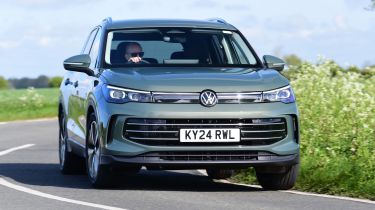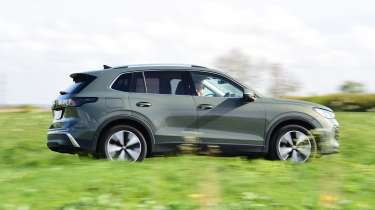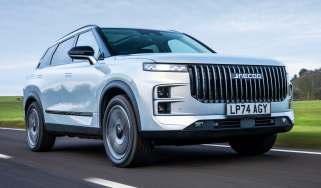Volkswagen Tiguan review - Engines, drive & performance
“The Tiguan feels stable composed and comfortable, making it a good all-rounder to drive”
The Volkswagen Tiguan has never been intended as a car to set your pulse racing, but rather as a comfortable all-rounder. As such, none of its petrol and diesel engine options are particularly spicy from launch, but should be perfectly capable of propelling a car of this size quickly enough to keep up with traffic. Later on, Volkswagen introduced two plug-in hybrid models with either 201bhp or 268bhp, though as is the case with most plug-in hybrids, these are likely to feel less sporty than their high power figures might suggest given the added weight of their batteries.
Overall, the Tiguan felt very stable and secure to drive, with good levels of comfort and refinement – even with the 19-inch wheels of our Elegance model fitted road and wind noise was kept to a minimum, but the true test will come when tested on UK roads.
When a model’s focus is on comfort – especially with regards to an SUV – you’d usually expect composure to suffer when pushing it to the max, but we found that the Tiguan felt stable, with minimum body roll on windier roads, though it’s still best driven in a more relaxed manner as it feels more suited to this driving style.
More reviews
The damping can be adjusted between a staggering 15 levels, but in all honesty we’d stick to the more comfort-focused end of the spectrum, because the trade off in ride quality on the firmer settings doesn’t result in a more engaging driving experience.
Is the Volkswagen Tiguan good to drive in town?
Visibility is good in the Tiguan, which should make manoeuvring around town easier, despite the car’s dimensions. The plug-in hybrids should fit the bill as good urban runarounds as they are capable of up to 77 miles of electric driving and electric mode is quiet and smooth. In fact, progress becomes noticeable more jerky once the battery is depleted.
Is the Volkswagen Tiguan good to drive on long journeys?
The Tiguan is impressively refined, with road noise from its wheels and tyres noticeable at 70mph, but still muted compared with most of its rivals. This helps to make Volkswagen's popular SUV more relaxed for long trips, but it's a shame the suspension continues to fidget and jostle slightly, even at cruising speeds.
Is the Volkswagen Tiguan good to drive on B-roads?
The Volkswagen Tiguan isn’t really a car you’d buy with the intention of thrashing it on a B-road, but if you do, you’ll find it feels very stable for an SUV. The steering doesn’t offer much in the way of feedback, though, and the diesel engine in our test car isn’t really suited to this kind of driving. The car’s Sport mode firms up the dampers and makes the steering feel more weighty, but it doesn’t increase driver engagement all that much, so we’d keep the Tiguan in Comfort mode and stick to driving it more gently.
When we tried the Tiguan back-to-back with the BYD Seal U, the Tiguan had the firmer suspension, but it was also far more positive in its responses and better controlled. As a result, while comfortable, the Seal U felt rather inert to drive in comparison.
Petrol models
From launch, entry-level cars are offered with a 1.5-litre mild-hybrid petrol engine, badged eTSI, with 128bhp – this gets the Tiguan from 0-62mph in 10.6 seconds. There’s also a 148bhp version of the same engine that does that sprint in 9.2 seconds. These engines will be better suited for those doing a mix of motorway and town driving, whereas the diesel will suit frequent motorway driving.
In August 2024, Volkswagen released a hotter petrol engine for the R-Line trim: a 2.0-litre TSI with 261bhp. The brand says it’s capable of doing the 0-62mph sprint time in 5.9 seconds with a top speed of 150mph. Though the R-Line plug-in hybrid has more power at 268bhp, the added weight means it’s not quite as quick, so this 2.0-litre is the fastest Tiguan you can buy. 4Motion all-wheel drive also adds an extra level of grip to put all that power down.
Adaptive Chassis Control comes as standard on the 2.0-litre TSI; this is a feature that can react to road conditions and the driving style in a matter of milliseconds to optimise your Tiguan with regard to your driving mode.
| Model | Power | 0-62mph | Top speed |
| 1.5-litre eTSI | 128bhp | 10.6 seconds | 123mph |
| 1.5-litre eTSI | 148bhp | 9.2 seconds | 130mph |
| 2.0-litre TSI | 261bhp | 5.9 seconds | 150mph |
Diesel models
Unlike many manufacturers who have turned their back completely on diesel engines, the new Tiguan is available with a tried-and-tested 2.0-litre TDI diesel engine with 148bhp. We drove this version in France and found it to be well refined, though as is expected of a diesel, it’s much more suited to a constant, lazy cruise on a motorway than propelling you through the twists and turns of a B-road, as it’s not the most responsive in these scenarios.
| Model | Power | 0-62mph | Top speed |
| 2.0-litre TDI | 148bhp | 9.4 seconds | 128mph |
Plug-in hybrid models
Volkswagen later released a couple of plug-in hybrid models with a 1.5-litre petrol engine and electric motor for the Tiguan, both badged eHybrid. Life trim and above can be had with a 201bhp system, while a higher-output model with 268bhp can be specified on R-Line models. The 201bhp eHybrid can do the 0-62mph sprint in 8.2 seconds, while the 268bhp version does the same a second quicker. The real appeal is in its ability to do shorter trips on electric power alone, which should make for more serene, silent driving around town.
| Model | Power | 0-62mph | Top speed |
| 1.5-litre eHybrid | 201bhp | 8.2 seconds | 130mph |
| 1.5-litre eHybrid | 268bhp | 7.2 seconds | 133mph |
Carbuyer notes
“The new Tiguan feels a lot like the old one, but that’s more of a compliment than a criticism. It’s still a refined and practical SUV, although it’s far from the best to drive in its class, and in diesel form it’s not as efficient as before." Alastair Crooks, Senior News Reporter
















